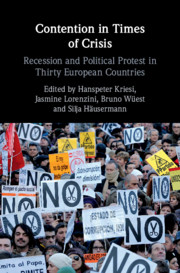Book contents
- Contention in Times of Crisis
- Contention in Times of Crisis
- Copyright page
- Contents
- Figures
- Tables
- Contributors
- Preface and Acknowledgements
- Part I A Study of Protest in Thirty European Countries
- 1 Introduction
- 2 Design and Methods of Semi-automated Protest Event Analysis
- 3 External Validation of Protest Event Analysis
- Part II Trends in Protest in the Great Recession
- Part III Sources of Protest
- Part IV Interaction Between Convention and Contention
- References
- Index
1 - Introduction
from Part I - A Study of Protest in Thirty European Countries
Published online by Cambridge University Press: 13 August 2020
- Contention in Times of Crisis
- Contention in Times of Crisis
- Copyright page
- Contents
- Figures
- Tables
- Contributors
- Preface and Acknowledgements
- Part I A Study of Protest in Thirty European Countries
- 1 Introduction
- 2 Design and Methods of Semi-automated Protest Event Analysis
- 3 External Validation of Protest Event Analysis
- Part II Trends in Protest in the Great Recession
- Part III Sources of Protest
- Part IV Interaction Between Convention and Contention
- References
- Index
Summary
Chapter 1 introduces the questions this volume is going to address, the empirical approach it is going to adopt, and the three regions of Europe that are going to serve as a key structuring device in presenting the results. The volume descriptively addresses three claims that have been made in the literature on protest mobilization during the Great Recession: the existence of an internationally interconnected protest wave, the transformation of action repertoires, and the ‘return of the economy’ in the demands of protesters. Second, the volume asks about the drivers of protest mobilization, relying on three key concepts of social movement studies – grievances, resources, and political opportunity structures. More specifically, the chapters assess the role of economic and political grievances in driving protest: Do economic grievances mobilize or de-mobilize protest? They analyze the role of political parties in organizing protest in times of crisis and ask which parties take to the streets in times of crises, and they consider the role of political opportunity structures in moderating the link between economic grievances and protest. Since the distinction between the macro-regions is so important for the presentation of the results, the introduction also provides three sets of arguments why this distinction makes sense as a general grid in the analysis of the data. These three sets of arguments are linked to the same three sets of explanatory factors.
Keywords
- Type
- Chapter
- Information
- Contention in Times of CrisisRecession and Political Protest in Thirty European Countries, pp. 3 - 28Publisher: Cambridge University PressPrint publication year: 2020
- 3
- Cited by



